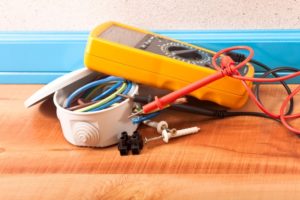Old electrical wiring increases your house’s risk of electrical shock, fire, and damage. A wiring upgrade can help you get rid of or minimize these risks. Here are some of the specific reasons old wiring is dangerous.
Degraded Insulation
Electrical insulation protects you from the electrical current that flows along your electrical wiring; insulation does this because it doesn’t conduct electricity. Insulation materials include things like PVC (a type of plastic), ceramic, and rubber, among others, but PVC is one of the most common.
Over time, exposure to different weather elements such as temperature fluctuations and moisture weakens the insulation material. Rubber, for example, loses its elasticity under high temperatures; and inelastic rubber can easily crack. Degraded insulation can easily get damaged or crack and expose your house to electrical dangers, such as electrical fires and shock.
Inadequate Capacity
The electrical contractor who designed and installed the original wiring in your house took into account the electrical needs at the time. Over time, you have probably increased your need for electrical supply. For example, you likely have more electrical appliances than you did a decade or so.
The increased need for electricity means your electrical wiring may not provide you with the power you currently need. For example, your electrical breaker might lack space for additional breakers, and you might run out of electrical outlets. An electrical upgrade can upgrade your wiring to meet your current needs for electricity.
Corroded Wires and Contacts
Rust is a poor conductor of electricity. Unfortunately, corrosion is a common feature in aging electrical wiring because electrical wires are metallic, and metals are susceptible to rust. Over the years, corrosion can eat into your electrical wires or contacts and affect their performance.
When metal wires corrode, the electrical resistance of the affected wires increased. Extremely high resistance can overheat electrical conductors and cause electrical fire and damage. Secondly, corrosion can eat into wires and even lead to breakage (electrical discontinuity). Not only that, but the corrosion also reduces the current you can get at your electrical outlets.
Accumulated Damages
People don’t upgrade their electrical wiring every time they suffer an electrical malfunction or damage. For example, when an outlet blows up, you don’t replace the whole circuit — just the dead outlet. In some cases, the repair job doesn’t end up quite as efficient as the initial installation.
A little inefficiency here and there might not affect your electrical wiring too much. Over the years, however, such little problems may add up and cause a severe deficiency and inefficiency in your electrical wiring. Such problems can particularly be serious if you are used to DIY electrical repairs, which are prone to mistakes. An upgrade can get your wiring back on track.
Outdated Wiring and Installations
Lastly, you should also upgrade your aging electrical wiring due to the outdated installations, techniques, and materials your house probably has. Electrical technology improves every day, and some of the technologies electricians considered safe and efficient several decades are ago are outdated today.
For example, some old wiring lacks grounding, uses knob and tube, and lacks GFCIs (ground fault circuit interrupters). Even the government updates its electrical code requirements regularly. An upgrade of your electrical wiring allows you to take advantage of the latest and best technologies in the electrical industry.
If your house is several decades old, get an electrician to inspect your electrical wiring and advise you on whether you need an upgrade. A to Z Electric Co. has the skills, tools, and experience to perform this assessment and upgrade. Contact us today for a quote and we’ll set you on your way to efficient and safe electrical wiring.

